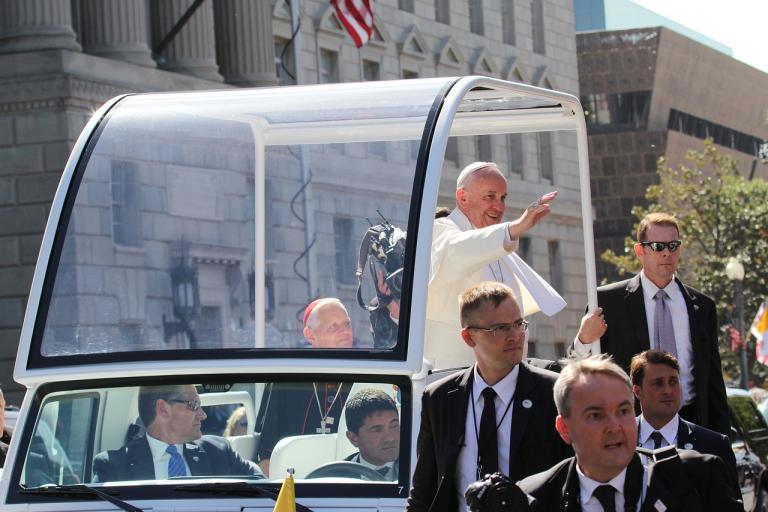
Over at Conciliar Post, Jacob Prahlow has an article suggesting that the emergence of nondenominational churches represents the most significant shift in institutional Christianity since the Reformation. While I’m a tad skeptical that all self-professed “nondenominational” churches are reaaaaaally nondenominational, I think he makes a very good point: within the Protestant fold, traditional denominational loyalties seem broadly to be dissolving, resulting in the proliferation of more individuated church bodies.
But is the emergence of nondenominationalism really the most significant “reformational” development in Christianity? Upon first reading Jacob’s piece, I wondered particularly about the potential for a Catholic rupture stemming from disputes over Pope Francis’s approach to certain social teachings.
A brief explainer for those unfamiliar with the biggest current controversy (no, actually it has nothing to do with the doctrine of hell): Traditionally, the Catholic Church has taught that marriage is sacramental and indissoluble: if entered into properly, marriage is for life. As a result, Catholics who divorce their spouses and remarry (while that former spouse is still alive) are ineligible to receive Holy Communion. Unless they elect to live as “brother and sister” with their new spouse (that is, abstaining from sexual relations), they may not commune. (However, there’s a loophole: the annulment process. If a church tribunal decides that the marriage was initially invalid under church law—taking a variety of considerations into account—both spouses are free to remarry and subsequently receive Communion.)
This teaching sounds severe to Western Protestants—and indeed, to many Catholics. In 2016, Pope Francis released the encyclical Amoris laetitia (“The Joy of Love”), which contained the following pronouncement: “[I]t is possible that in an objective situation of sin—which may not be subjectively culpable, or fully such—a person can be living in God’s grace, can love and can also grow in the life of grace and charity, while receiving the Church’s help to this end.” In context, this language clearly refers to those formally ineligible to receive the Eucharist based on their marital status. This sentence was followed by a footnote, which controversially stated that “[i]n certain cases, this [help from the Church] can include the help of the sacraments. Hence, ‘I want to remind priests that the confessional must not be a torture chamber, but rather an encounter with the Lord’s mercy.’ . . . I would also point out that the Eucharist ‘is not a prize for the perfect, but a powerful medicine and nourishment for the weak.’”
While Pope Francis’s language is undeniably ambiguous, for many conservative Catholics this appeared to be a significant shift away from the Church’s traditional teaching: that marriage is indissoluble, and that divorce and remarriage erects a barrier between congregant and Eucharist. The debate over the meaning of Amoris—and, more broadly, over the direction and implications of Francis’s papacy—continues to roil Catholic intellectual circles (as ably chronicled by Ross Douthat in his recent book “To Change the Church: Pope Francis and the Future of Catholicism”). The consequences of a major split in the Catholic world would, obviously, be dramatic.
Not being Catholic myself, I’m perhaps outside my wheelhouse in even commenting on this issue, but there’s an important point in this debate that troubles me. Namely, characterizations of Amoris as uniquely disruptive to traditional teaching—or, perhaps, uniquely damaging to the sacramental view of marriage—seem (at least in my mind) difficult to square with the laxity of the existing annulment process (Douthat briefly touches on this point in a recent podcast interview). In order to obtain an annulment, a petitioner must show that one of five requisite elements of a Catholic marriage—freedom, consent, intent to be faithful, intent of the other’s good, and consent given in the presence of witnesses before a church official—was not met. Married on a beach by a Presbyterian minister? Marriage invalid. Fully expected to cheat during the marriage at some point? Marriage invalid. “Incapable of consenting” due to poor judgment at the time? Marriage invalid.
In short, the grounds for requesting annulment are so broad that they seem (at least to me) largely incompatible with the traditional “indissolubility” view of marriage. This “loophole problem” is reflected in the data: roughly 90% of annulment requests are granted (as of 2014). So, assuming both the sacramental view of marriage and that Amoris indeed represented a break from historic teaching, I’m left that the actual theological difficulties commonly attributed to Amoris really aren’t unique to that document. From the perspective of an Amoris critic, any pushback against Amoris really ought to be accompanied by pushback against a lenient annulment system.
But perhaps there’s a more fundamental conflict here.
At least from a functional standpoint, I wonder if the Amoris debate is perhaps better characterized as a dispute over process and authority rather than over indissolubility itself. Statistically speaking, the median Catholic seeking to remarry and receive Communion may do so once they pursue an annulment of their first marriage: their petition will almost certainly be granted. But today, individuals simply aren’t going to the trouble of requesting annulments (admittedly there is a financial cost associated with this process, but it’s not hard to think of ways this could be offset).
Amoris (again assuming the “disruptive” reading) outsources the process of “marital status adjudication,” taking the matter outside church tribunals and apparently committing it to priests’ pastoral discretion. The institutional church loses its jurisdiction over these questions (previously, annulment determinations could be appealed all the way to Rome through the Church’s judicial hierarchy). The process, in other words, becomes individualized.
And insofar as critics of Amoris are concerned by this shift, they are right to be worried. A similar individualist impulse seems to rest at the heart of Protestant nondenominationalism—a resistance to process and authority, and the constraints associated with formal confessional strictures. In the context of Catholicism, that process and authority rests at the heart of the Church’s universalizing claim.
So at bottom, I find myself sharing Jacob’s conclusion, even if somewhat indirectly. Deinstitutionalization—whether it takes the form of ad-hoc annulment processes or the proliferation of nondenominational churches—certainly does represent a sea change in the ecclesiastical landscape, with consequences that will be difficult to foresee. Time will tell.












